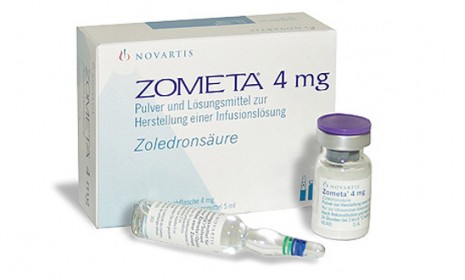The bone drug that boosts breast cancer survival rates
Researchers say the bone-strengthening medication Zometa helps young women fight off cancer relapses. Why?

A free daily email with the biggest news stories of the day – and the best features from TheWeek.com
You are now subscribed
Your newsletter sign-up was successful
Health experts are optimistic that a bone-strengthening drug could help recovering breast cancer patients stave off relapses. Researchers found that when premenopausal survivors were given treatments of Zometa intravenously, the medication actually helped to increase their survival rate — with some doctors saying it ushers in a new "standard of care." Here's what you should know:
How did this study work?
Researchers gave young women Zometa to "prevent complications and relapses" from breast cancer, and got "impressive" results, says Marilynn Marchione at USA Today. The patients were found to have a 37 percent lower risk of death. That means that "4 to 5 more women out of every 100 were alive seven years later." Between two test groups of roughly 900 breast cancer survivors each, "there were 33 deaths among women given the bone drug and 49 among those not treated with it" — meaning Zometa's effectiveness was "comparable to many chemotherapy treatments."
The Week
Escape your echo chamber. Get the facts behind the news, plus analysis from multiple perspectives.

Sign up for The Week's Free Newsletters
From our morning news briefing to a weekly Good News Newsletter, get the best of The Week delivered directly to your inbox.
From our morning news briefing to a weekly Good News Newsletter, get the best of The Week delivered directly to your inbox.
Why is this?
One factor, say researchers, may have something to do with how Zometa strengthens bones. This effectively makes it "tougher for cancer to spread there," says Marchione. It's also possible that Zometa might have "direct effects against circulating cancer cells or microscopic tumors," although more research is needed on that point.
Are there any side effects?
There are. Zometa must be administered as an infusion, "one every six months for three years," says Charlene Laino at Web MD, and patients can experience side effects including bone and joint pain, and fever.
A free daily email with the biggest news stories of the day – and the best features from TheWeek.com
But it's still a good thing?
For younger patients, at least. It's important to note that the drug did not help postmenopausal women, "who account for three-fourths of all breast cancer cases," says Laino. There is reason for optimism, but researchers warn that they'll need to gather more data before they can recommend Zometa as a standard course of treatment.
-
 The ‘ravenous’ demand for Cornish minerals
The ‘ravenous’ demand for Cornish mineralsUnder the Radar Growing need for critical minerals to power tech has intensified ‘appetite’ for lithium, which could be a ‘huge boon’ for local economy
-
 Why are election experts taking Trump’s midterm threats seriously?
Why are election experts taking Trump’s midterm threats seriously?IN THE SPOTLIGHT As the president muses about polling place deployments and a centralized electoral system aimed at one-party control, lawmakers are taking this administration at its word
-
 ‘Restaurateurs have become millionaires’
‘Restaurateurs have become millionaires’Instant Opinion Opinion, comment and editorials of the day